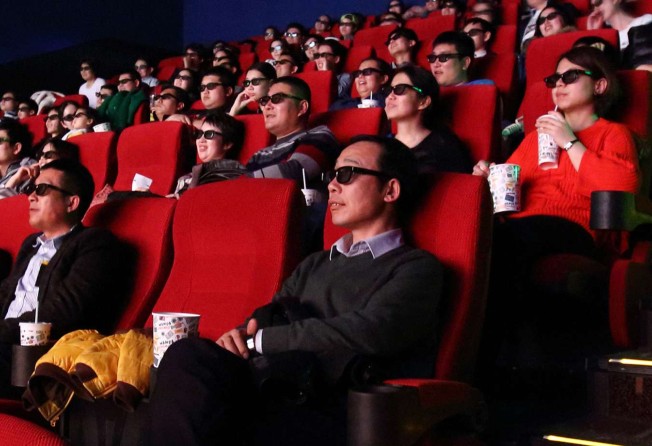
Chinese cinema 2016: the winners and losers in a year of disappointment

Last year was, by any measure, a tough one for China’s cinema industry.
Market growth stalled to a sputtering 3.73 per cent from a mind-blowing 48 per cent expansion in ticket sales a year earlier. It marked the most anaemic growth of the last decade.
As big screen revenues plunged, observers began to mourn the end of a five-year boom that had seen box office receipts achieve average annual growth of about 40 per cent.
In a faltering economy where steel plants are laying off workers and factories are moving to Southeast Asia, the rise of cinema has been a much-needed money machine for Chinese magnates. And when film releases bombed, their pain was acute.
The sudden change in fortunes at home prompted film giants such as Dalian Wanda Group, owned by China’s richest man Wang Jianlin, to set their sights on Hollywood.
So which Chinese studios were the biggest losers during a dismal year, and which managed to weather the storm? We take a look at 2016’s biggest cinematic winners and losers:
Winner: China Film Group
Thanks to China’s all-time top grossing film, The Mermaid, state-owned China Film Group is the undisputed 2016 box office champion. The Stephen Chow comedy earned 3.39 billion yuan in ticket sales during the Lunar New Year, generating a spectacular 347 per cent return on investment. Unlike those caught up in Hollywood blockbuster euphoria, the China Film focused on teaming up with home-grown talents such as Chow, with whom they churned out household favourites like Kung Fu Hustle and CJ7.
The Beijing-based filmmaker and distributor boasts four of the year’s 10 highest-grossing films (the others being Warcraft, Kung Fu Panda 3 and Monkey King 2), with combined box office receipts topping 9 billion yuan, roughly one fifth of the country’s total.

Winner: Beijing Enlight Pictures
Just like their Hollywood counterparts, Chinese filmmakers often rely on big name stars to move the needle. Last year, Beijing Enlight Pictures rolled the dice by making small-budget romance films, but powered by a heavyweight cast. The strategy paid off.
I Belonged to You, a romantic comedy starring heartthrobs Yang Yang and Deng Chao - who played the male lead in The Mermaid - notched up 814 million yuan in receipts, having been made on a 70 million yuan budget.
Enlight won critical acclaim for the art-house animation hit Big Fish & Begonia, which earned 565 million yuan at a cost of about 70 million yuan.
A financier of The Mermaid, Enlight takes the crown as the most profitable film company of 2016.
Loser: Wanda Cinemas
Under the watchful eye of billionaire Wang Jianlin, the studio found itself struggling after the loss of its mastermind and former chief executive, Ye Ning, who now heads rival Huayi Brothers Media. After riding high in 2015 with the surprise hit Mojin-The Lost Legend, Wanda saw only two of the six films it financed take more than 100 million yuan at the box office. Altogether it raked in only 671 million yuan in ticket sales, despite also operating China’s largest theatre chain that typically allocates more screening slots to its own films.
There was a silver lining in that Legendary Entertainment, the Hollywood studio Wanda acquired in 2016, made a splash in China with its fantasy hit Warcraft. But another big budget title, The Great Wall, starring Hollywood A-lister Matt Damon and directed by Oscar nominee Zhang Yimou, lost money at the China box office.
Loser: Huayi Brothers Media
Before China’s five-year movie boom gave birth to new market entrants, Huayi was regarded as the country’s dominant privately-owned media empire. But a string of stumbles in 2016 has made the road to restoring past glory seem bumpy, at best.
Although I am not Madame Bovary, a social satire directed by legendary Feng Xiaogang and tipped as an award contender, managed to break even, it was nowhere to be found in China’s top 25 grossers of 2016. Audiences also did not bother showing up to Huayi’s end-of-year release The Wasted Times (109 million yuan), despite the casting of Zhang Ziyi and Cannes Film Festival Best Actor, Ge You.
The studio’s biggest disappointment, however, was Rock Dog, a Chinese-Hollywood co-produced animation that only managed to pull in 39.62 million yuan. No other film with a 400 million yuan budget fared as poorly last year.
Loser: Le Vision Pictures
Big name actors don’t always translate to big box office gains. That was the expensive lesson for LeEco’s film arm, Le Vision Pictures, in 2016. The studio bet big on three expensive titles, two of which flopped.
Matt Damon wasn’t enough to sell The Great Wall, while China’s best-paid actress Fan Bingbing and former EXO member Kris Wu failed to entice filmgoers to see fantasy epic Lord: Legend of Ravaging Dynasties, which made just 383 million yuan from a 200 million yuan investment. Tomb Raiders (100 million yuan), starring another former EXO member, Lu Han, offered some relief, however. It was the fifth highest grossing film of the year, on a 170 million yuan budget.